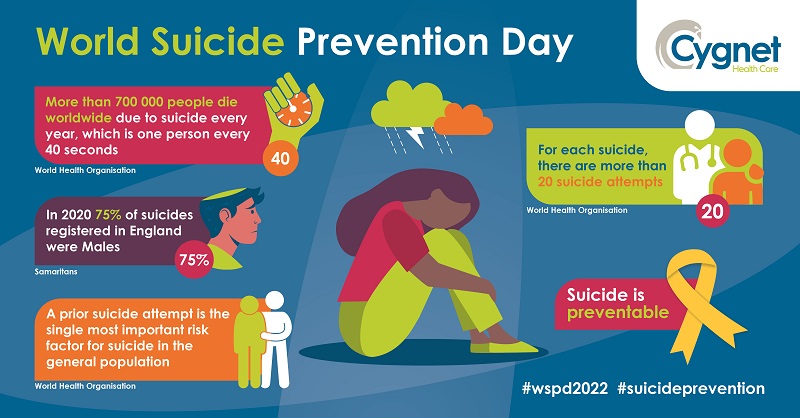
Each death by suicide is a tragedy. Suicide prevention remains a national priority. Across the health sector, local authorities have suicide prevention action plans and multi-agency partnerships in place.
Yet loved ones of those struggling with their mental health, have an important role to play. Armed with the right tips and tools to support our loved ones, we can help prevent suicide.
This guidance will help enable a thought through approach to suicide prevention. Preventing suicide is a jigsaw, which requires many pieces to come together. Every life lost represents someone’s partner, child, friend or colleague, and their death will profoundly affect an entire community. Suicide is preventable and we can all work together, armed with key tools, to ensure every person we know is protected from the risk of suicide and its damaging impact on so many lives.
Facts and Figures

Supporting Someone with Suicidal Thoughts
1. Know The Warning Signs
You can’t always tell when a loved one or friend is considering suicide. But here are some common signs:
- Talking about suicide — for example, making statements such as “I’m going to kill myself,” “I wish I were dead” or “I wish I hadn’t been born”
- Getting the means to take their own life, such as stockpiling pills
- Withdrawing from social contact and wanting to be left alone
- Having mood swings, such as being emotionally high one day and deeply discouraged the next
- Being preoccupied with death, dying or violence
- Feeling trapped or hopeless about a situation
- Increasing use of alcohol or drugs
- Changing normal routine, including eating or sleeping patterns
- Doing risky or self-destructive things, such as using drugs or driving recklessly
- Giving away belongings or getting affairs in order when there is no other logical explanation for doing this
- Saying goodbye to people as if they won’t be seen again
- Developing personality changes or being severely anxious or agitated, particularly when experiencing some of the warning signs listed above
2. Listen non-judgementally
When going through a difficult period, everyone needs someone who would listen to them. Encourage them to talk. It is important to be non-judgemental and allow them to express their distress.
Asking someone if they feel suicidal or are planning to end their life may not feel like the right thing to do but it is the recommended approach. Some people worry that this might indirectly encourage the person who is feeling suicidal to act on their feelings, but in reality research has shown that speaking openly about suicide decreases the likelihood of the person acting on their feelings.
Asking simple, direct questions can encourage them to be honest about how they are feeling. Many people feel relieved and less isolated when they are asked. By asking someone directly about suicide, you give them permission to tell you how they feel, and let them know that they are not a burden. It is often a huge relief for them to be able to open up and share their distress with someone they trust.
If you feel able to listen, you could ask them about how they are feeling. The best way to do this is to:
- Ask open questions. Avoid giving them the opportunity to simply reply “Yes” or No”. Some good examples include “Tell me how you are feeling”, “Describe to me what it feels like”, “What is life like for you right now”. Give them time. You might feel anxious to hear their answers, but it helps if you let them take the time they need.
- Take them seriously. It is a common, yet dangerous myth, to believe that someone who talks about suicide doesn’t intend to act upon those feelings. Always assume they are telling the truth. It’s best to assume that they are telling the truth about feeling suicidal.
- Do not judge, no matter how shocked, scary or upsetting it is to hear their feelings. They have been very brave in sharing their thoughts so do not blame them for their feelings.
- Be direct. There is still a taboo around talking about suicide which can make it even harder for people experiencing these feelings to open up and feel understood. Direct questions about suicide like ‘Are you having suicidal thoughts?’ or ‘Have you felt like you want to end your life?’ can help someone talk about how they are feeling.
3. Encourage them to seek help
Professionals are trained to support people who are at high risk of suicide. Sometimes people do not seek help for many reasons, including due to fear of stigma, fear of being admitted to hospital or increase / change of medication.
It is important to be patient. You might want to know more details about their thoughts and feelings, or want them to get help immediately. But it’s essential to let them set the pace for seeking support themselves. Let them know that it is okay to receive help from trained professionals and assure them that you will be there to support them on their journey. It is important to gently encourage them to be open with their clinical team, if they are already cared by a clinical team.
4. Offer practical help
There are lots of practical things you can do to support someone who is ready to seek help. For example:
- Look for information that might be helpful. When someone is seeking help they may feel worried about making the right choice, or feel that they have no control over their situation.
- Help to write down lists of questions that the person you’re supporting wants to ask their doctor.
- Help to organise paperwork, for example making sure that your friend or family member has somewhere safe to keep their notes, prescriptions and records of appointments.
- Go to appointments with them, if they want you to – even just being there in the waiting room can help someone feel reassured.
- Ask them if there are any specific practical tasks you could help with. This may include offering them a lift somewhere, arranging childcare for them, taking over a chore or household task.
5. Encourage them to continue to take their treatment
It is important that they continue to take medication if they are already on treatment. Sudden discontinuation of medication sometimes can increase risk of suicide.
It can be very worrying if you’re supporting someone who wants to come off medication and you disagree with their decision. It might help to talk to them about your worries, and to explore support options for yourself.
You could always contact their GP if you feel concerned.
6. Discourage them from using illicit drugs or alcohol to cope with distress
People often tend to turn to illicit drugs or alcohol to cope with distress. This is counterproductive as drugs and alcohol often acts to depress mood and worsen suicidal feelings. They can further aggravate social problems and complicate existing difficulties.
7. Intervene if there is a serious risk to someone’s life.
You may have to contact social services or their care team (if they are already under a mental health team) if there is a grave and immediate danger to their or someone else’s life.
If someone has hurt themselves and you think their injuries are life-threatening, call an ambulance on 999. You can do this whether you are with them in person or not. You will need to be able to give a location.
Looking After Yourself
If you feel that someone you care about is clearly struggling but can’t or won’t reach out for help, and won’t accept any help you offer, it’s understandable to feel frustrated, distressed and powerless. But it’s important to accept that they are an individual, and that there are always limits to what you can do to support another person.
Supporting someone else who is really struggling with their mental health and having suicidal thoughts can be challenging and emotionally exhausting. Making sure that you look after your own wellbeing can mean that you have the energy, time and distance to help someone else.
- Take a break when you need it.
- Talk to someone you trust about how you’re feeling.
- Set boundaries and be realistic about what you can do. Your support is really valuable, but it’s up to your friend or family member to seek support for themselves. Remember that small, simple things can help, and that just being there for them is probably helping a lot.
- Share your caring role with others, if you can. It’s often easier to support someone if you’re not doing it alone.